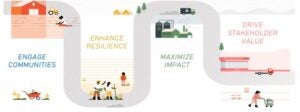Within the private sector, the role of social sustainability is evolving significantly. While traditional Corporate Social Responsibility (CSR) approaches focus on what companies owe to society and remain isolated within the business, new approaches to social sustainability and impact are embedded across the business and view impacts on society as integral to driving long-term business strategy, innovation, and growth.
At CARE Impact Partners, we see this every day when we advise large corporations on how embedding social sustainability and impact strategies across the business can accelerate inclusive growth, improve business resilience, future proof supply chains, mitigate compliance risk, and ultimately drive value to their diverse stakeholders. We believe that private sector leaders will increasingly become those that recognize these benefits and take the action needed to build social sustainability and impact into the core of their business.

CARE Impact Partners works with the private sector to form strategic relationships that help integrate social sustainability across businesses and their global supply chains. This work is grounded in the belief that the impacts on society are integral to business strategy, innovation, and growth. Using CARE’s expertise and global reach, we work with clients to develop the tools, strategies, and partnerships they need to advance social sustainability and impact within their business.
- Sustainability Standards: Assist clients in navigating evolving social sustainability standards, from assessing and understanding community impact to designing and measuring programs that meet targets
- Strategy Development: Develop and operationalize practical solutions that mitigate business risk and create positive change for people in corporate supply chains
- Impact Frameworks: Using CARE’s measurement expertise, work with corporations to better understand, measure, and communicate their social impact
- Programming in Supply Chains: design and implement social programs focused on achieving positive impact and building business resilience
- Capacity Building: Build the capacity of employees, vendors and supply chain partners to understand and implement social sustainability practices
- Partnership Facilitation: bring together public and private sector partners to share best practices and gain collective understanding of social sustainability and impact in global supply chains
In this 2024 blog series we will highlight lessons learned from current and past CIP engagements and what works when helping clients embed socially sustainable practices across their business – building equitable supply chains, enabling long-term resilience, and fostering positive community impact.
